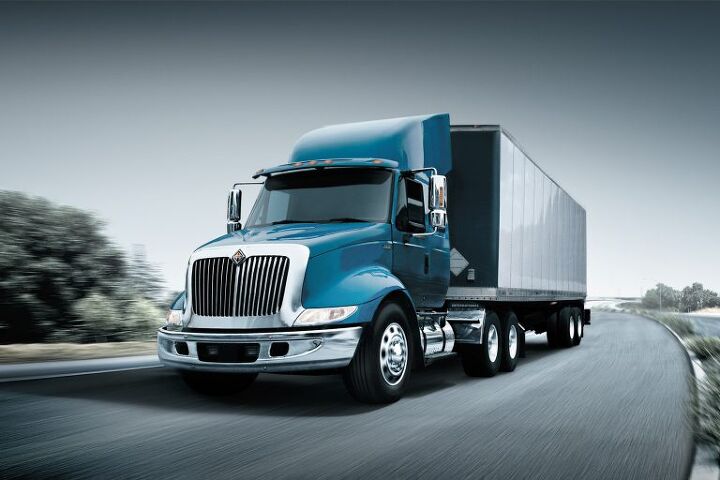Volkswagen Buys Stake in Navistar, Wants a Slice of the U.S. Heavy Truck Market

Volkswagen’s commercial vehicles division is eager to enter the U.S. heavy truck market, and it just found a partner to help pull it off.
Volkswagen Truck & Bus has announced it will buy a 16.6 percent stake in U.S. truck maker Navistar International Corp., a share buy worth $256 million. Both companies hope to save money (and make more of it) through the technology-sharing deal, with joint products on the horizon.
The automaker’s MAN and Scania truck brands already have a solid presence in the European truck market, but the U.S. market is too tempting to pass up. Breaking into it isn’t easy (or cheap), so Volkswagen went looking for an alliance. Navistar hopes to reverse a sales and revenue slide through the partnership.
“Our collaboration, especially with regard to the powertrain, will considerably increase our synergy potential,” said Matthias Gründler, CFO of Volkswagen Truck & Bus, in a joint media release. “Navistar will be able to profit from excellent powertrain technologies and we, in turn, will benefit from significantly higher volumes. Initiating this strategic alliance now will enable us to implement the requirements of Navistar into our joint component platforms from the get-go.”
As part of the deal, Volkswagen Truck & Bus will fill two seats on Navistar’s board of directors. The deal, which includes a joint procurement venture, is expected to be finalized in late 2016 or early 2017.
Volkswagen’s truck division has borrowed a strategy from its passenger car division, which once sought global dominance (before the diesel emissions scandal threw a wrench into those plans). By entering new markets, the division wants to become a “worldwide leading commercial vehicles group in terms of profitability, innovations for its customers and global presence,” Volkswagen claims.
The automaker hopes to achieve this status within a decade. Making more money from its truck division is a key part of the automaker’s 2025 strategy.
“Starting in the near term, this alliance will benefit our purchasing operations through global scope and scale,” said Troy Clarke, President and CEO of Navistar, in a statement. “Over the longer term, it is intended to expand the technology options we are able to offer our customers by leveraging the best of both companies and enabling Navistar to deliver enhanced uptime.”
Clarke claims the deal will improve Navistar’s flagging fortunes.
[Image: Navistar]

More by Steph Willems
Latest Car Reviews
Read moreLatest Product Reviews
Read moreRecent Comments
- Probert They already have hybrids, but these won't ever be them as they are built on the modular E-GMP skateboard.
- Justin You guys still looking for that sportbak? I just saw one on the Facebook marketplace in Arizona
- 28-Cars-Later I cannot remember what happens now, but there are whiteblocks in this period which develop a "tick" like sound which indicates they are toast (maybe head gasket?). Ten or so years ago I looked at an '03 or '04 S60 (I forget why) and I brought my Volvo indy along to tell me if it was worth my time - it ticked and that's when I learned this. This XC90 is probably worth about $300 as it sits, not kidding, and it will cost you conservatively $2500 for an engine swap (all the ones I see on car-part.com have north of 130K miles starting at $1,100 and that's not including freight to a shop, shop labor, other internals to do such as timing belt while engine out etc).
- 28-Cars-Later Ford reported it lost $132,000 for each of its 10,000 electric vehicles sold in the first quarter of 2024, according to CNN. The sales were down 20 percent from the first quarter of 2023 and would “drag down earnings for the company overall.”The losses include “hundreds of millions being spent on research and development of the next generation of EVs for Ford. Those investments are years away from paying off.” [if they ever are recouped] Ford is the only major carmaker breaking out EV numbers by themselves. But other marques likely suffer similar losses. https://www.zerohedge.com/political/fords-120000-loss-vehicle-shows-california-ev-goals-are-impossible Given these facts, how did Tesla ever produce anything in volume let alone profit?
- AZFelix Let's forego all of this dilly-dallying with autonomous cars and cut right to the chase and the only real solution.


































Comments
Join the conversation
Detroit Allison is still making diesel engines and still has a good image.
Ve hav a zolution to our diesel engine problem. Da engineers hav configured zis I-24 from six recalled engines da Americans are making us buy back, for uze in da truck configuration. Za engine uzes these chains that are impossibly zycronized in dis configuration, to combine za power of all six motors. Engine maintenance being near impossible, and very expenzive - vee expect enthusiasts to buy zees and insist to others, "zey are not all zat bad to work on." However, because zis is in a truck, vee don't have to worry about emissions. [EVIL LAUGHTER]